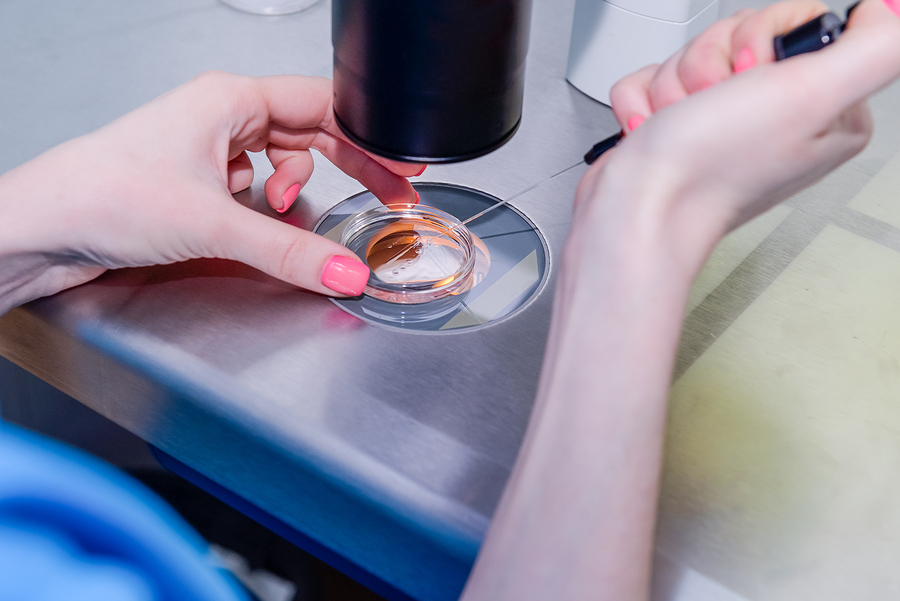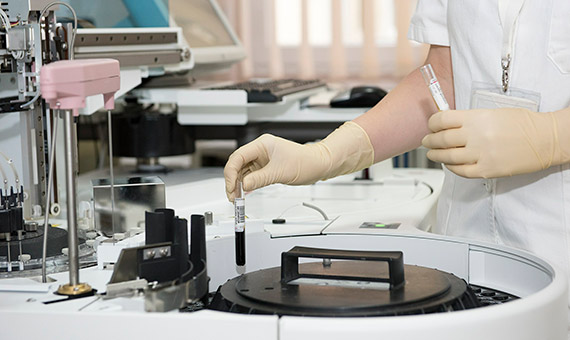IUI TREATMENT
Intrauterine insemination is a relatively simple infertility treatment where a small catheter is used to place washed sperm directly into the uterus. This procedure is useful in couples where the male has low semen volume, low sperm concentration, or decreased sperm motility. This procedure is also indicated when there is ejaculatory dysfunction. It may also be used to treat conception difficulties caused by cervical mucus problems, or immunologic factors in the woman and in conditions where the female cervix and vagina is hostile to the male sperms. It can be tried as a low cost but possibly successful attempt before deciding on IVF.
IVF PROCEDURE
In Vitro Fertilisation (IVF) is one of several techniques available to help people with fertility issues. This procedure involves removing an egg from the woman’s ovaries and fertilizing it with a sperm in the laboratory. The fertilised egg called an embryo is then returned to the woman’s womb to grow and develop. The procedure is carried out using the woman’s eggs and her partner’s sperm or eggs and/or sperm from donors.
In this procedure, washed prepared sperms are deposited into the woman’s uterus (womb) at around the time of ovulation, with the aim of getting the sperm as close to the egg as possible. Washing ensures that mucus and non-motile sperms are removed so that the chances of pregnancy are increased. Sometimes two inseminations may be necessary during a fertility window to further enhance the chances of pregnancy. The procedure for insemination is very simple, fast and painless. It involves insertion of a speculum into the vagina to visualize the cervix and then cervix is cleaned with culture medium. The prepared sperm is then injected into the cavity of the womb using a fine plastic catheter. After insemination, a little rest for the patient is advisable.
IVF is a popular and tested treatment option that works for thousands of couples. It can grant people their wish of becoming parents when most other approaches have failed. The truth however is that IVF doesn’t always work and for most at least not at the first attempt. There are many couples out there that have to go through more than one cycle of IVF before getting pregnant. It can be very hard to accept when your IVF treatment does not work and it can be very difficult to understand why.
The five main reasons behind the failure of IVF are:
- Female age
- Embryo quality
- Ovarian response
- Implantation issues
- Sperm Quality and Sperm DNA
Female age
Your likelihood of getting pregnant decreases over time. Since each woman is born with a certain number of eggs, as you age you use those eggs up. Your likelihood of a live birth after IVF is greater the younger you are. Some studies show that the likelihood of a live birth after IVF for a woman age 35 is around 32%, but only 16% for a woman who is 40. Of course, this is not a guarantee that IVF won’t work in specific cases.
Embryo quality
Quality of the embryo can be another contributing factor to IVF failure. Some embryos have genetic or chromosomal abnormalities that can make them too weak to work for IVF. Other embryos don’t have enough cells to survive and are less likely to fertilize. There are quite a few things that can contribute to embryo quality, which can eventually lead to IVF failure.
Ovarian response
Sometimes a woman’s ovaries just do not respond properly to the IVF medications that try to get the ovaries to produce multiple eggs. If you already have a reduced number of eggs, are over 35 or 37 or have elevated FSH levels, it might be harder for your body to respond properly to IVF medications. In short, if your body listens to the medication and produces more eggs, your IVF is likely to be successful. If it doesn’t then the chances of failure of IVF will be greater.
Implantation issues
Implantation issues are probably the most common reasons behind the failure of IVF treatment. Most times implantation issues occur simply because the embryo just stops growing for no reason in particular. Polyps in uterus or cysts on ovaries could also be a contributing factor to implantation issues. Some research even suggests that chromosomal abnormalities that can cause implantation issues in embryos can be present in as many as 50% of cases!
This equation can illustrate the implantation process:
Embryo quality + receptivity of uterine lining = chance for implantation and pregnancy
Sperm quality and DNA
Increasing sperm DNA fragmentation or damage is associated with:
- Poorer fertilization
- Poorer embryo quality
- Poorer pregnancy rates
- Increased risk of miscarriage
These are the five most common reasons for IVF treatment to fail. Just because you experience a failed IVF attempt doesn’t meant that you should give up trying to get pregnant. That is not the case at all. Talk candidly with your doctor about what he or she thinks might have gone wrong and if there is anything that you or your partner could do to help things go smoothly the next time around. The most important thing is to stay positive and not give up!
Why does an embryo deteriorate or weaken and not implant?
The five main reasons behind the failure of IVF are:
- Female age
- Embryo quality
- Ovarian response
- Implantation issues
- Sperm quality and sperm DNA
Age Factor
Your likelihood of getting pregnant decreases over time. Since each woman is born with a certain number of eggs, as you age, you use those eggs up. Your likelihood of a live birth after IVF is greater the younger you are. Some studies show that the likelihood of a live birth after IVF for a woman aged 35 is around 32%, and is only 16% for a woman who is 40. Of course, this is not a guarantee that IVF won’t work in specific cases.
Embryo Quality
Quality of the embryo can be another contributing factor to IVF failure. Some embryos have genetic or chromosomal abnormalities that can make them too weak to work for IVF. Other embryos don’t have enough cells to survive and are less likely to fertilize. There are quite a few things that can contribute to embryo quality, which can eventually lead to IVF failure.
Ovarian Response
Sometimes a woman’s ovaries just do not respond properly to the IVF medications that try to get the ovaries to produce multiple eggs. If you already have a reduced number of eggs, are over 35 or 37 or have elevated FSH levels, it might be harder for your body to respond properly to IVF medications. In short, if your body listens to the medication and produces more eggs, your IVF is likely to be successful. If it doesn’t, then the chances of failure of IVF will be greater.
Implantation Issues
Implantation issues are probably the most common reasons behind the failure of IVF treatment. Most times, implantation issues occur simply because the embryo just stops growing for no reason in particular. Polyps in uterus or cysts in ovaries could also be a contributing factor to implantation issues. Some researches even suggest that chromosomal abnormalities that can cause implantation issues in embryos can be present in as many as 50% of cases!
This equation can illustrate the implantation process:
Embryo quality + receptivity of uterine lining = chance for implantation and pregnancy Sperm Quality and DNA
Increasing sperm DNA fragmentation or damage is associated with:
- Poorer fertilization
- Poorer embryo quality
- Poorer pregnancy rates
- Increased risk of miscarriage
These are the five most common reasons for IVF treatment to fail. Just because you experience a failed IVF attempt doesn’t meant that you should give up trying to get pregnant. That is not the case at all. Talk candidly to your doctor about what he or she thinks might have gone wrong and if there is anything that you or your partner could do to help things go smoothly the next time around. The most important thing is to stay positive and not give up!
What are the steps involved in IVF treatment?
Why IVF at NewLife Advanced Fertility Center?
IVF FAQs
Why IVF at NewLife AdvancedFertility Center?
Is the egg retrieval painful?
Will the egg retrieval damage my ovaries?
Is bleeding expected after the egg retrieval?


